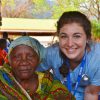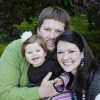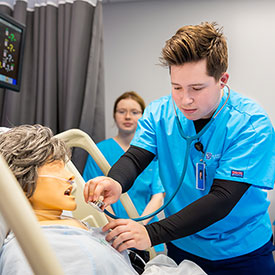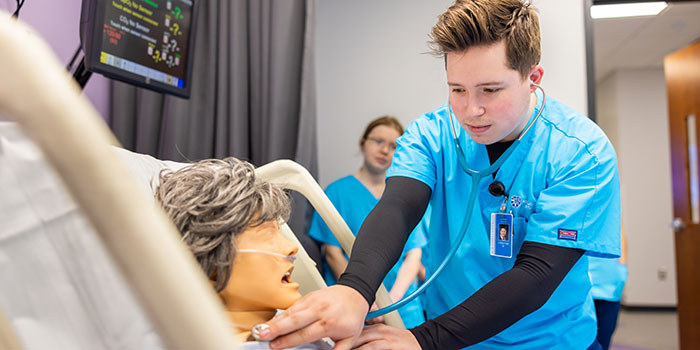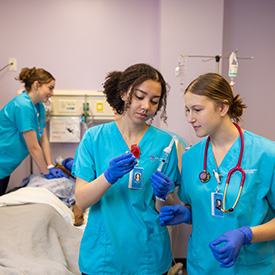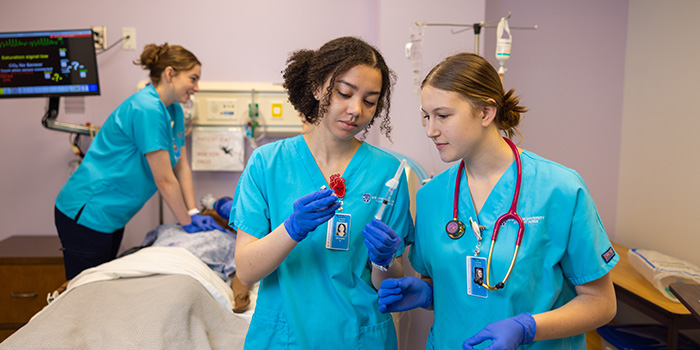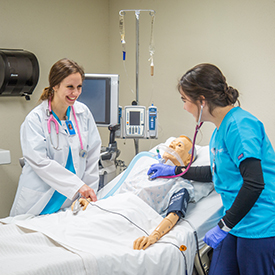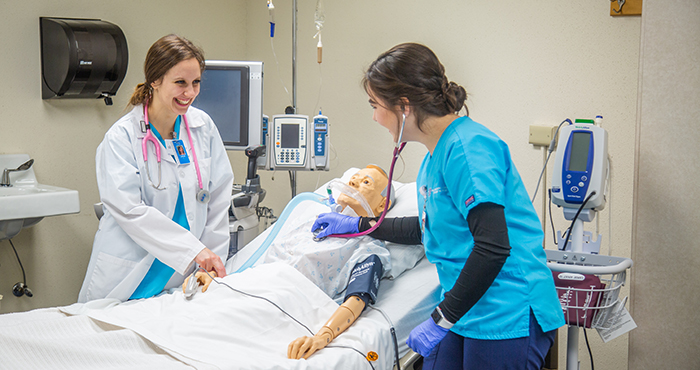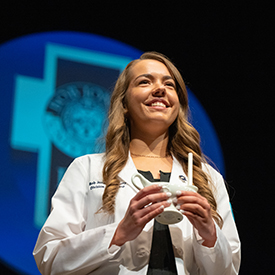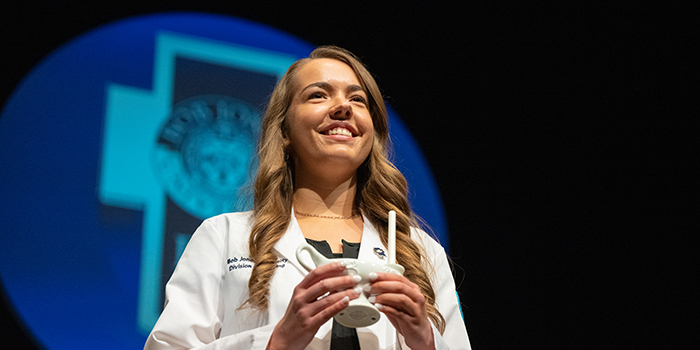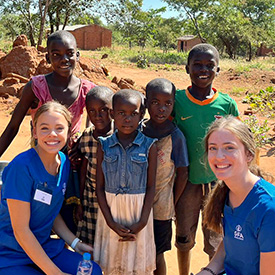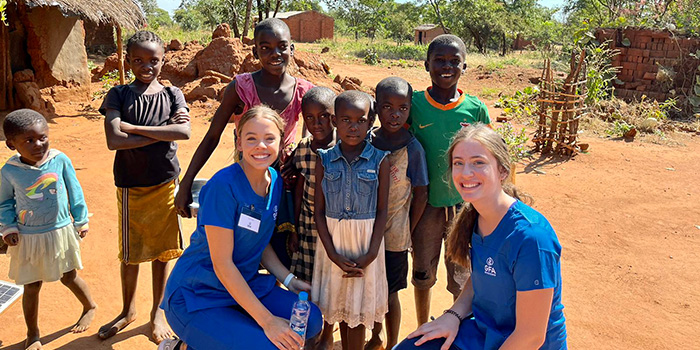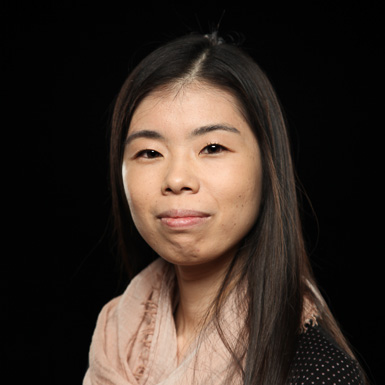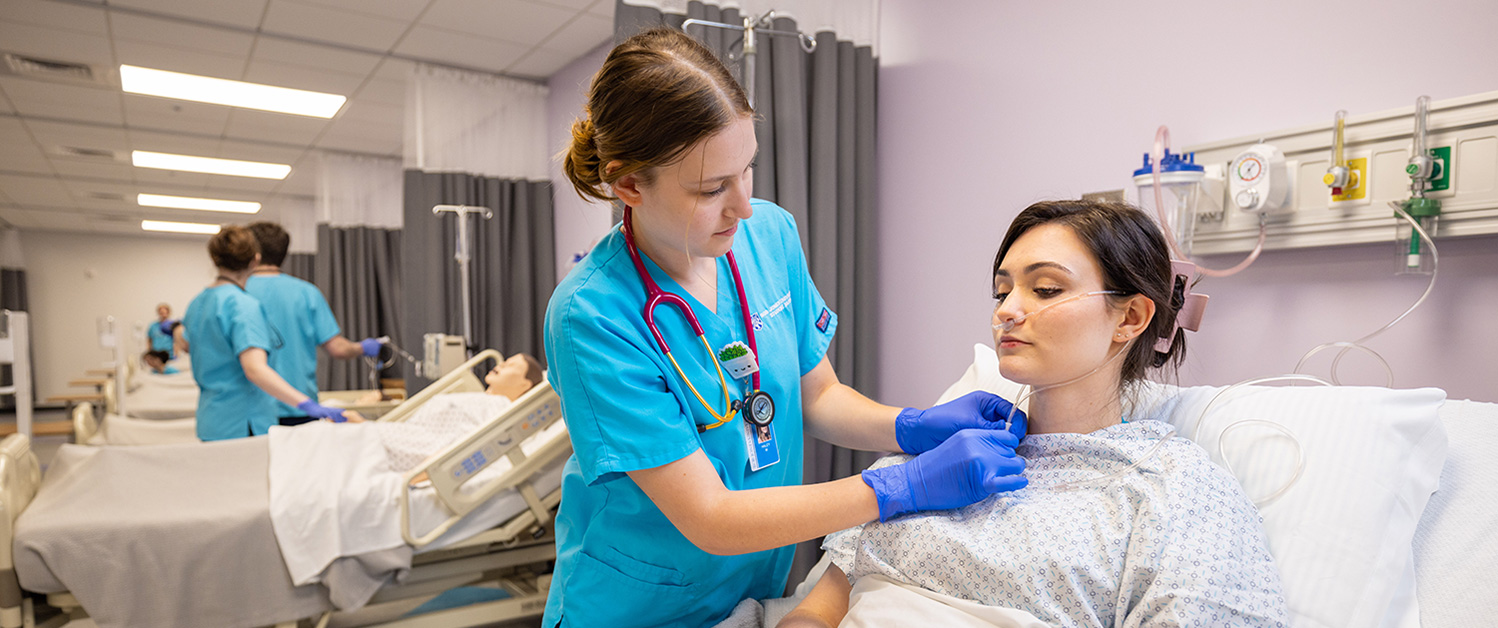
Nursing
Bachelor of Science in Nursing
Program Overview
As a nurse you’ll have the chance to transform a patient’s experience—just by the way you administer medication, treat wounds, communicate essential information, provide emotional support and so much more.
Through the challenging classes and clinical program at BJU, you’ll be equipped with the skills and the confidence you need to succeed. But beyond that, you’ll be inspired to view nursing as a calling, not just a career. To view your patients as souls, created in the image of God. To view your daily tasks as a chance to show Christ’s love in tangible ways.
Your Future
- Nursing fields
- Anesthesiology
- Acute Care
- Cardiology
- Cardiovascular ICU
- Dialysis
- Emergency Department
- Labor/Delivery
- Long-term Care
- Medical Missions
- Medical Surgical ICU
- Neonatal ICU
- Neuro-trauma ICU
- OB Clinical Nurse Education
- Operating room
- Oncology
- Orthopedics
- Pediatrics
- Rehabilitation
- Wound Clinic
- Public and private hospitals
- Doctors’ offices
- Missionary service
- Nursing homes
- Health departments
- Rehabilitation centers
- School nurse
- Public health nursing
- Large teaching hospitals
- Other community services
The nursing major at BJU opens the door to many career possibilities including:
Career Support
BJU offers students a variety of ways to network with employers and organizations. A multitude of job opportunities are posted each year on Career Central, our online job board. In addition, more than 60 businesses and 150 Christian schools/mission boards/Christian organizations come on campus to recruit students through on-campus interviews and job/ministry fairs.
Career Services also helps students by holding seminars on resume preparation and interview techniques.
Accreditation & Recognition
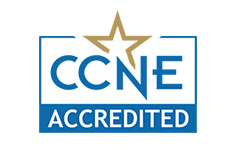
The baccalaureate degree program in nursing at Bob Jones University is accredited by the Commission on Collegiate Nursing Education (http://www.ccneaccreditation.org).
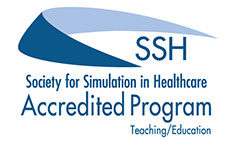
The BJU nursing simulation center is accredited in Teaching and Education by Society for Simulation in Healthcare (ssih.org).
Our nursing program is approved by the South Carolina Board of Nursing.
Testimonials
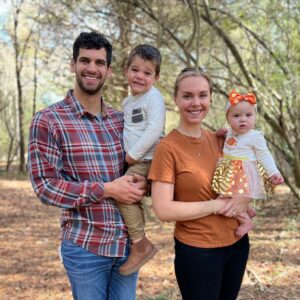
Josh Roach, ’19
Since graduating in 2019, I have had many wonderful experiences as a nurse. I have recently spent the past two years travel nursing with my family, exploring all over the country. We have met new friends and reconnected with old ones.
I earned my Critical Care Registered Nurse (CCRN) certification in 2020 and used that to work in a wide range of critical care units. I am currently enrolled in a BSN to DNP program and my goal is to work as a nurse practitioner.
During my time at BJU, I was able to participate in a medical mission trip to the country of Honduras. That experience planted a love for medical missions!
I have many fond memories at BJU, but the ones I treasure the most are the ones related to the nursing program. I remember the countless study groups and practicing for lab check-offs together. Relying on my classmates to push me and challenge me helped shape me to be the best nurse possible. The faculty also played a major role in the success I had in the program. Without their encouragement, test reviews and personalized studying tips, I would not be where I am today.
Learning Experience
As a nursing student at BJU, you’ll gain a solid academic foundation through intensive courses such as Human Anatomy & Physiology, Pharmacology and Microbiology (to name just a few).
You’ll also gain important hands-on experience through a patient simulator lab with adult, maternal, child and newborn simulators, providing as life-like an experience as possible, complete with breath sounds and vital signs.
Before graduating, you’ll complete six semesters of clinical experience (most RN programs feature only four semesters of clinicals). Practicum, a capstone experience during your senior year, will solidify your nursing skills and judgment, as well as give you opportunities for development of leadership and management skills.
To ensure your success, you’ll use ATI as a resource to supplement your mastery of nursing school content; track your progress and ultimately prepare to pass the state board NCLEX exam.
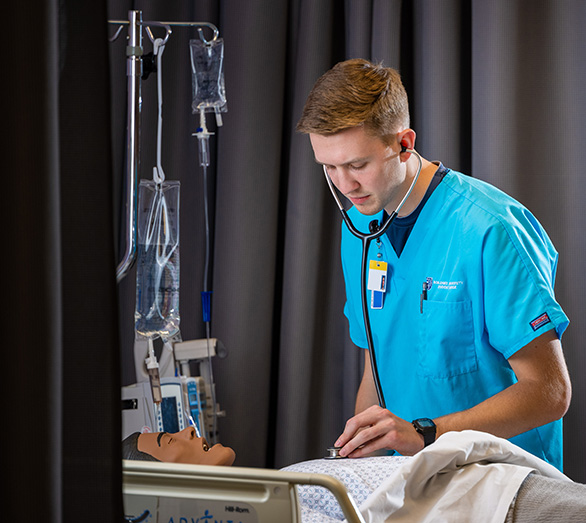
BJU Core
You’ll also benefit from the BJU Core, a unique combination of Bible and liberal arts courses taken by every BJU student. Bible courses, as well as daily chapel services and godly professors, will nurture your growth in Christlikeness. Liberal arts courses will broaden your horizons and equip you with skills essential both for nursing and for all of life—skills such as critical thinking and problem-solving, effective communication, ethical decision making, adaptability and much more.
Electives
The nursing program is highly specialized, leaving little room for elective classes. However, nursing faculty members do encourage nursing students to take extra counseling, ministry or Bible classes as they are able, in order to further prepare themselves for serving the Lord.
Minimum Requirements for Acceptance into Clinical Nursing Courses
Admission to nursing clinical courses is competitive. Therefore, students must meet the minimum requirements as designated below in order to be considered for placement into clinical courses. Please note that meeting the following minimum entrance requirements does not guarantee admission into clinical courses. The “preferred” grades/scores noted in each of the requirements below indicate what is typically necessary for students to gain admission to clinical courses and to succeed in the Nursing program as a whole.
- Successful completion of the following courses with a final grade of C- or above (preferred: A or B)
- Bio 102: Principles of Biology
- Either Bio 303 or 304: Human Anatomy and Physiology
- Chm 105: Foundations of Chemistry
- Successful completion of the ATI (Assessment Technologies Institute) — TEAS Nursing Pre-Admission Test (offered each semester). Students with an Academic Preparedness Level of Proficient or higher will be given first priority for admission into clinical nursing courses.
- GPA: Student must maintain a grade point average of 2.75 or above at BJU
- Interview with the division chair to review above requirements and discuss next steps.
Optional Recommendation for Acceptance into Clinical Nursing Courses
Students in nursing programs must take frequent standardized tests during and after program completion. For this reason, we strongly recommend our students take a standardized test prior to enrollment to identify strengths and weaknesses in this area.
If students opt not to take the SAT, ACT, or CLT prior to enrollment at BJU, the University may require placement testing per their policy.
- ACT Examination: scores of 20 or above on the math, science and composite areas. The preferred composite ACT score: > 23.
Recommended High School Preparation
- At least three years of mathematics, including algebra and geometry
- At least three years of science, including at least one year of chemistry and one year of biology
Transferring into the Nursing Program
Transfer students who meet the prerequisites listed above and desire to enter clinical courses directly should complete the following steps to be considered:
- Apply to BJU
- Request all official transcripts be sent to the Registrar.
- Contact the Division of Nursing directly
The deadline to complete the prerequisites and the steps listed above is April 1 to be considered for the following fall semester and August 1 to be considered for the following spring semester. Students who have questions or concerns may contact the Chair of the Division of Nursing.
Faculty Spotlight
Ai Kato holds a bachelor’s degree in nursing from BJU and a master’s degree in nursing from Gardner-Webb University. Her classes include Nursing Research and Health Assessment.
Courses/Objectives
1st Year
2nd Year
3rd Year
- Advanced Pharmacology
- Mental Health Nursing
- Pediatric Nursing
- Bible Doctrines
- English or Writing Elective
(3 credits)
4th Year
- Program
- BJU Core
- Elective
Program Objectives
Each student will:
- Implement safe patient-centered care that integrates critical thinking, problem-solving principles and evidence-based practice across the lifespan and in all healthcare settings.
- Utilize appropriate biblical worldview and ethical principles when applying clinical reasoning and judgment to make decisions and solve problems in the healthcare field.
- Utilize interpersonal communication skills in order to establish and maintain therapeutic and collaborative relationships in the healthcare setting.
- Demonstrate accountability for personal and professional behavior.
- Apply leadership principles to the management of care including collaboration with clients and healthcare professionals.


